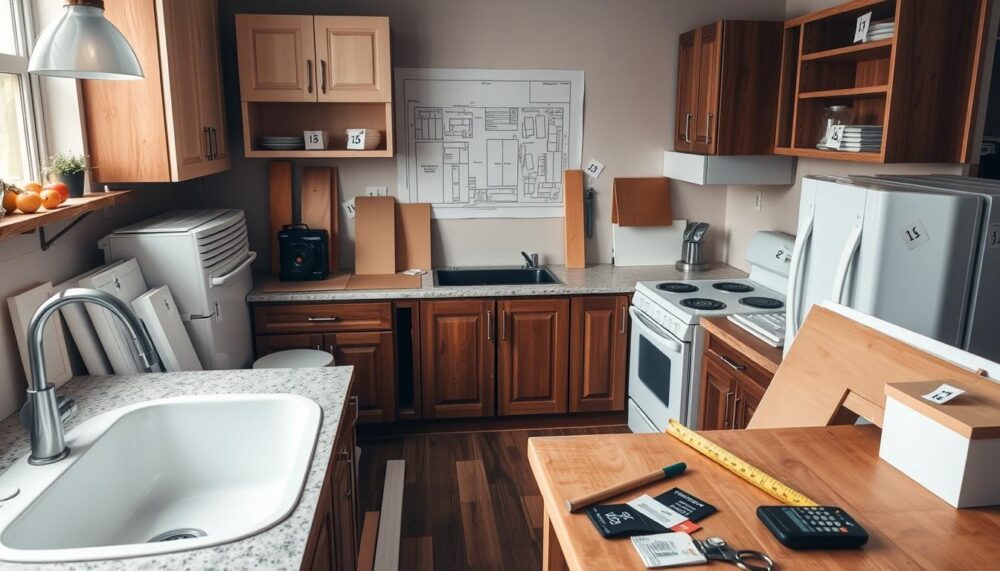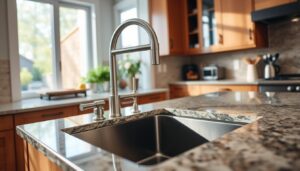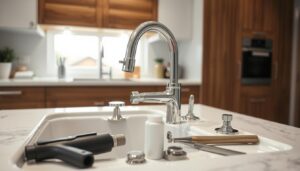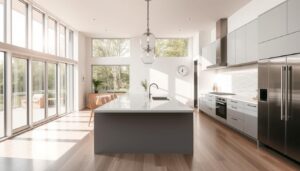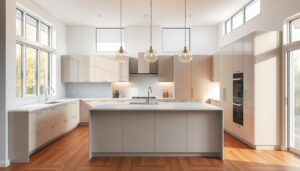Kitchen installation costs vary based on project scale, material quality, design complexity, and location. Experts suggest dividing your budget into specific percentages for different components. Units should take 25%, worktops 10%, and appliances 15% of the total budget.
Allocate 5% for sink and tap, 10% for tiles or wallcoverings, and 15% for flooring. Lighting and heating should get 10%. Reserve the final 10% for finishing touches and unexpected expenses1.
Quality results depend on professional kitchen installation. Get at least three detailed quotes from trusted kitchen fitters. This helps you understand cost breakdowns and ensures value for money23.
Costs can escalate quickly with various tasks involved. These include removing existing kitchen elements, floor, and wall tiles. Gas work, electrical and plumbing tasks also contribute to expenses.
Installing new flooring and worktops adds to the overall cost2. Thorough market research and multiple quotes help create a realistic budget. This approach ensures a successful and satisfying kitchen renovation project.
Understanding the Cost Components of a Kitchen Renovation
Kitchen renovations involve various cost factors. These include kitchen cabinets cost, worktop prices, and kitchen appliance expenses. Understanding these elements is crucial for a successful makeover. Detailed guides and pricing breakdowns offer valuable insight into the financial aspects.
Kitchen Units and Worktops
Kitchen cabinet costs vary widely. Budget-friendly flatpack units start under £2,000, while high-end bespoke solutions exceed £25,0004. Worktop prices range from £100 per m² for laminate to £300+ per m² for granite or quartz4.
Integrated storage and kitchen islands can enhance functionality. However, these features may increase the overall kitchen cabinets cost.
Appliances and Fixtures
Kitchen appliance expenses depend on quality and energy efficiency. High-end appliances cost between £1,000 and £5,000 each. Mid-range options range from £500 to £2,0004.
Budget-friendly choices are available for under £500. Smart home integration and sustainable elements can also influence kitchen appliance expenses.
Labour costs for worktop prices can be significant. Kitchen fitters typically charge around £115 per day. Installation can take 1 to 3 days5.
Careful planning and prioritising needs over wants are crucial. Explore cost-saving strategies like comparing quotes and strategic financing options4. A professional designer’s expertise can add value to your project4.
“A kitchen renovation budget in the UK can span from £10,000 to £50,000 based on selections made, with potential costs ranging from £4,750 to over £60,000 for different kitchen types. About 40% of kitchen makeovers exceed budget expectations.”5
Cost Breakdown: Kitchen Units and Worktops
Kitchen renovation costs vary widely. Budget-friendly cabinets start at £32 per unit. Mid-range kitchens cost between £5,000 and £15,000. High-end or bespoke kitchens can exceed £25,0006.
Worktop prices range from £7 to £100 per m². Timber worktops cost £150 to £350 per m². Granite or quartz can exceed £300 per m²6. Consider integrated storage and kitchen islands for efficiency.
The average UK kitchen fitting costs £6,000. This covers about 14 square meters. Installation for this size costs around £3,500. Kitchen fitters charge £250 to £350 per hour6.
Electricians, plumbers, and tilers have daily rates. Electricians charge £250 to £400. Plumbers cost £325 to £375. Tilers charge £150 to £2506.
Installing kitchen units costs £40–£55 per cabinet. Laying worktops ranges from £200 to £470. Sink fitting costs about £100, plus £170 to £220 for plumbing6.
Sink prices vary from £50 to £300. Basic stainless-steel sinks are cheapest. High-end ceramic or composite models cost more. Tap prices range from £20 to £2006.
Cost Breakdown: Appliances and Fixtures
Kitchen renovations can be costly, especially when it comes to appliances and fixtures. Prices vary based on quality and features. Energy-efficient appliances may cost more initially but can save money long-term7.
Essential fixtures like sinks and taps typically make up 5% of the total renovation budget7. Installation costs can add up, particularly for specialised electrical and plumbing work7.
- Tap installation costs £80-£120, depending on complexity7.
- Sink installation costs £40-£50 per hour, totalling about £200 for 2-4 hours7.
- Electric oven installation ranges from £100-£150, potentially more if rewiring is needed7.
- Fridge installation costs £50-£100, unless pipes need moving7.
- Extractor fan installation costs £190-£220 and takes 2-4 hours7.
Understanding these costs helps homeowners plan better for their kitchen renovation. It ensures informed decisions that align with overall budgets and needs31.
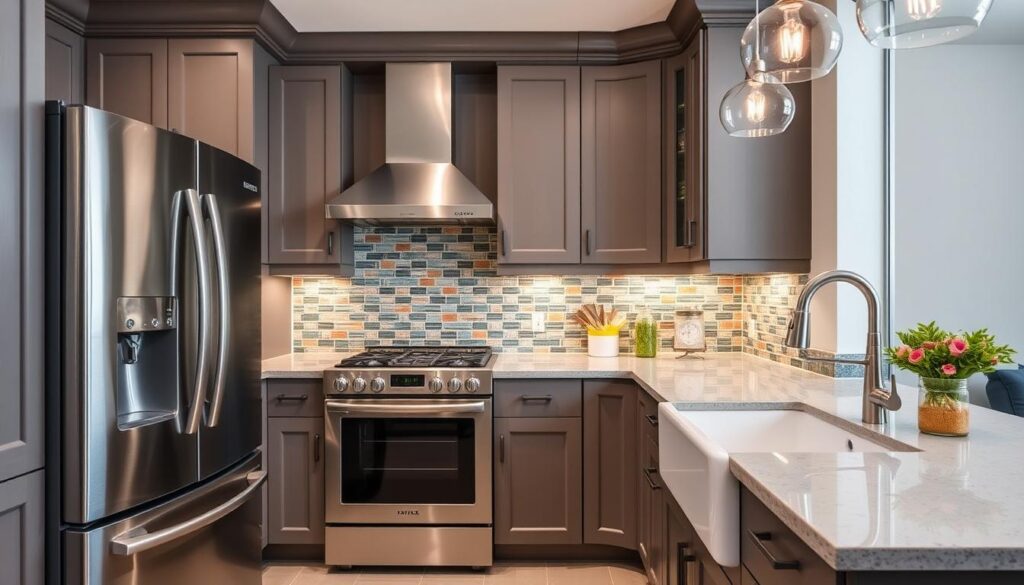
Selena, MD and founder of PAD Bespoke Kitchens, advises setting aside 10% for kitchen installation contingencies1.
How Much Does It Cost to Install a Kitchen?
Kitchen installation costs vary greatly based on size, complexity, and materials. UK homeowners typically spend £5,000 to £12,000 for a new kitchen. The average installation takes about 2 weeks8.
A basic 10m2 kitchen costs roughly £6,900. This includes removing the old kitchen, plumbing, electrics, unit installation, and tiling8.
Skilled tradespeople charge around £150 per day for labour. This usually makes up 20-30% of the total cost9. Kitchen fitting can range from £500 for small jobs to £1,500 for larger ones8.
The kitchen’s size, layout complexity, and extra work like electrics or plumbing affect the overall cost. It’s wise to set aside 10-20% extra for unexpected expenses9.
Appliances, fixtures, and fittings prices vary based on materials and brands chosen. These items can significantly impact your total budget. Consider all these factors to get a realistic cost estimate.
FAQ
What are the typical cost components for a kitchen renovation?
Kitchen renovation budgets typically include several key components. Units account for 25%, worktops 10%, and appliances 15%. Sink and tap take 5%, tiles or wallcoverings 10%, and flooring 15%.
Lighting and heating consume 10%, with finishing touches taking another 10%. Installation costs are calculated separately from these percentages.
How much do kitchen cabinets typically cost?
Kitchen cabinet prices vary widely based on quality and design. Budget-friendly flatpack units can cost under £2,000 for a complete kitchen. Mid-range options typically fall between £5,000 and £15,000.
High-end bespoke solutions can exceed £25,000, offering premium materials and customisation.
What are the costs for kitchen worktops?
Worktop prices differ based on material choice. Laminate is the most affordable at £100 per m². Timber worktops range from £150 to £350 per m².
Premium materials like granite or quartz can cost £300+ per m², offering durability and luxurious aesthetics.
How much do kitchen appliances and fixtures cost?
Appliance costs vary based on quality and energy efficiency. Essential fixtures like sinks and taps usually take about 5% of the total budget.
Remember to factor in professional installation costs. Specialised electrical and plumbing work may be required for proper setup.
What are the typical kitchen installation costs?
Kitchen fitting costs range from £500 for small jobs to £1,500 for larger installations. Skilled tradespeople typically charge from £150 per day for their services.
Installation timelines vary from 4-6 days, depending on the kitchen’s size and complexity.
What additional costs should be considered for a kitchen renovation?
Factor in costs for electrical work, plumbing, and potential building regulation compliance. It’s wise to include a 10-20% contingency fund for unexpected expenses.
Why is it important to obtain multiple quotes for a kitchen installation?
Gathering at least three fully-itemised quotes is crucial for effective budget planning. This practice helps ensure quality results and fair pricing.
Professional kitchen installation is vital for achieving the best possible outcome for your renovation project.

